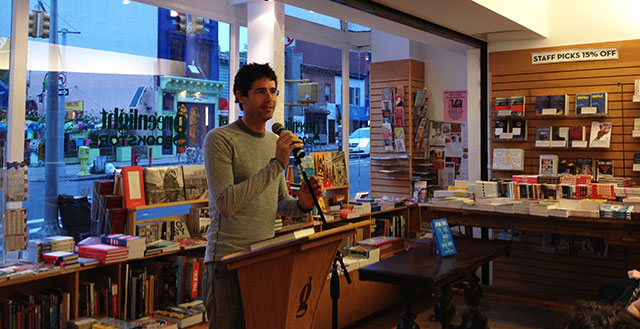
Joshua Ferris read from his latest novel To Rise Again at a Decent Hour at Greenlight Bookstore in Brooklyn.
The novel explores the life of a dentist obsessing over his online doppelgänger through the neurotic voice of the protagonist. Ferris has a knack for portraying characters in otherwise bland occupations. His debut novel, Then We Came to the End (2007) chronicles the final days of an ad agency while The Unnamed (2010) features an overworked lawyer.
Ferris had launched the book Tuesday at McNally Jackson and he begins by offering a short anecdote from that evening: a woman declared he had said the absolutely most offensive thing she had ever heard. As she spoke to him, he grew concerned that maybe he had crossed a line in his reading–Catholicism plays a role in the new novel and the narrator seems skeptical of the religion. But then the woman turned to his publicist and said, “call the police!” leading Ferris to assume she maybe just didn’t have all of her senses about her.
To Rise Again at a Decent Hour opens with the dentist discovering that some unknown person has created a new website for his dental practice. Nobody consulted him and he wants the site down, and so begins the long spiral into the anxious relationship with his internet double.
Ferris explains that he often captures characters’ personalities through their occupations. Once he gives them a job, the character begins to come to life in a very real way. He begins to understand who they are. From there he can build out the world through tangible, understandable ways. He describes what he calls the “He-Man Game,” the way he would play as a child creating false worlds, as part of the process of creating characters.
To Rise Again at a Decent Hour was one of two novels he began working on in 2003. He found himself having trouble with the book. He spent eight months writing what he describes as a “bad version” before walking away from it for a while. He considered returning to advertising. He eventually earned a short term grant and had to choose which novel to work on. The grant was his last chance, he told himself. Afterward, the results he says, didn’t convince him to keep going at all.
He finished two other novels before he eventually returned to the manuscript. By 2010, the internet had grown-up from the early 2000s when he wrote the first draft. He says the internet offered the missing piece to the book.
He describes the research he did for the book to be “like a cow grazing.” He read up on dentistry passively collecting facts and ideas. He got a broad sense of what practicing dentistry was like. Once he started writing he must be much more specific and then he is focused on the small details to make the occupation seem much more real.
He did talk to a dentist, he says, though the dentist was older, and the main take away was that dentists were mostly looking to retire.
The book does deal with the Catholic religion. Ferris says he has a lot of affection for the Catholic mass and the Catholic church. He’s half Catholic, though he only started attending services when his parents divorced. He was eight. His mother was searching for something and wanted to find it in Catholicism. Then she met a Protestant.
Ferris describes his family as suffering from multiple denomination syndrome. They were promiscuous Christians, he says, switching congregations as suited his mother.
The other religion in the book is the Red Sox. He says as a child, he was a fan. But he has sinced checked out. He lives in Brooklyn.
Joshua Ferris
Greenlight Bookstore
Wednesday, May 14, 2014